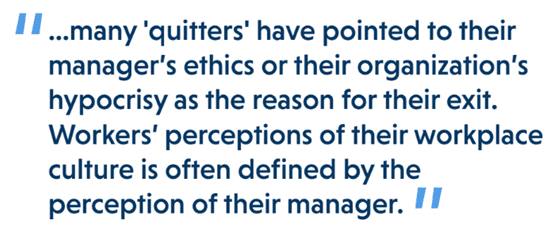2022 E&C Hotline Benchmark Report Insights: The Great Resignation


This article was taken from ComplianceLine’s 2022 Ethics and Compliance Hotline Benchmark Report. Get more information here!
The Great Resignation
2021 saw a record high number of workers quitting their jobs, 48 million people in the so-called Great Resignation. Why?
According to a 2022 Pew Research Center survey, the top reasons included: low pay, lack of advancement opportunities, and workplace disrespect.[1] Blame for the Great Resignation cannot be solely placed at the feet of COVID-19, but the pandemic has certainly been a catalyst for mobility.
The shift to remote work opened up opportunities for workers at companies well beyond their commute range. Those workers suddenly had millions of new opportunities for work available at their fingertips. Additionally, pandemic-related policies alienated some employees and caused, or emphasized, divides in the workforce.
Although the pandemic was not the root of these issues, it did exacerbate existing ones such as the increase in work hours (both required and voluntary) and redistributed responsibilities. Because of these issues, both white-collar and blue-collar workers have experienced burnout. Whereas white-collar workers are presently more concerned with the option of remote work, blue-collar workers are motivated by scheduling flexibility and how they manage their time.[2]
Moral Injury
E&C teams help to combat this exodus of talent by ensuring ethical integrity across any organization to prevent moral injury.
Workers want their employers to minimize “moral injury,” a trauma response to witnessing or participating in workplace behaviors that contradict one’s moral beliefs in high-stakes situations. To suffer a moral injury is to suffer a betrayal of what a worker believes to be right and anyone who has ever suffered through a betrayal knows how hard it is to trust the betrayer again. Issues with moral injury were only exacerbated by the pandemic and the lack of existing policies around novel issues.[3]
E&C plays a role in many areas that can factor into retaining talent and preventing workforce losses stemming from the Great Resignation. Research shows that factors including corporate responsibility
, work-place ethics, company culture, and management, all impact retention. Millennial and Gen Z workers particularly want to see their employers taking on social responsibility, with Gen Z even demanding it of the brands whose products they purchase.[4] This includes D&I initiatives within the company, as well as with the people companies serve.[5]
Millennial Priorities
Retaining Millennials, the generation with the most individuals having significant student loan debt, is only going to become more difficult if an organization only uses pay and benefits to retain them. The burden of debt pushes Millenials to seek career moves that improve their financial situations, particularly early in their careers while they have fewer responsibilities and assets.
Overall among this generation, there has developed a “Later Culture” of delayed life events, like marriage, home purchases, and having children, giving them even more flexibility and mobility. As the age of eligibility for Social Security benefits delays, even retirement is a compelling impetus for younger generations to seek increased salaries.
What happens when Millennials do not see their wages or salary increase?
They will go elsewhere the moment they suffer their first moral injury. A strong culture, built on true ethical integrity, plays a role in retaining these workers. According to Great Place to Work, Millennials are over 22x more likely to stay at their job for a long time when they believe their company has a high-trust culture (almost 2x more than Baby Boomers).[6]
A strong culture should be intentional and purposeful, incorporate all members of the group, and essentially be a culture of solidarity. This is particularly important to E&C professionals as the damage to corporate culture from exits can raise concern that cultural shortcomings are actually the cause of employees leaving.
Opportunities Abound


Exit interviews are a good tactic to pinpoint managerial issues among your departing employees,[8] when fear of retaliation — the biggest factor preventing workers from speaking up — is at its lowest. Stay interviews, conducted during an employee’s present tenure, are another smart way to identify the challenges employees are currently facing and provide feedback on what makes them stay in their roles and with the company.[9]
The impacts of the Great Resignation are profound and burdensome with trends continuing. The high price from the loss of institutional knowledge and the costs incurred to replace employees can affect negative change, if not outright harm. Moving forward, companies need to focus on these pain points to achieve success in retaining employees who are still leaving in droves.
E&C can use this trend as an opportunity to not only make meaningful strides to reinforce an authentic pursuit of the organization’s mission, but also to prove the strategic capabilities we possess to affect the thing that possibly no other department can — a true culture of integrity.
Want more actionable insights, data, and stats on the future of compliance programs? Get the ComplianceLine 2022 Ethics and Compliance Benchmark Report here.
—
[1] Parker & Horowitz. (2022, March 9) Majority of workers who quit a job in 2021 cite low pay, no opportunities for advancement, feeling disrespected. Pew Research Center. Retrieved from https://www.pewresearch.org/fact-tank/2022/03/09/majority-of-workers-who-quit-a-job-in-2021-cite-low-pay-no-opportunities-for-advancement-feeling-disrespected/
[2] Bartleby. (2021, November 27). Managing the Great Resignation. The Economist. Retrieved from https://www.economist.com/business/2021/11/27/how-to-manage-the-great-resignation
[3] Carucci R. & Praslova L. (2022, February 21) Employees Are Sick of Being Asked to Make Moral Compromises. Harvard Business Review. Retrieved from https://hbr.org/2022/02/employees-are-sick-of-being-asked-to-make-moral-compromises
[4] Petro. (2021, April 30). Gen Z Is Emerging As The Sustainability Generation. Forbes. Retrieved from https://www.forbes.com/sites/gregpetro/2021/04/30/gen-z-is-emerging-as-the-sustainability-generation/
[5] O’Boyle. (2021, March 30). 4 Things Fen Z and Millennials Expect From Their Workplace. Gallup, Inc. Retrieved from https://www.gallup.com/workplace/336275/things-gen-Millennials-expect-workplace.aspx
[6] Carucci. (2021, October 11). To Retain Employees, Give Them a Sense of Purpose and Community. https://hbr.org/2021/10/to-retain-employees-give-them-a-sense-of-purpose-and-community
[7] O’Boyle. (2021, March 30).
[8] Bartleby. (2021, November 27).
[9] Nawaz (2022, March 14). What Stops People on Your Team from Leaving? Harvard Business Review. Retrieved from https://hbr.org/2022/03/what-stops-people-on-your-team-from-leaving





































